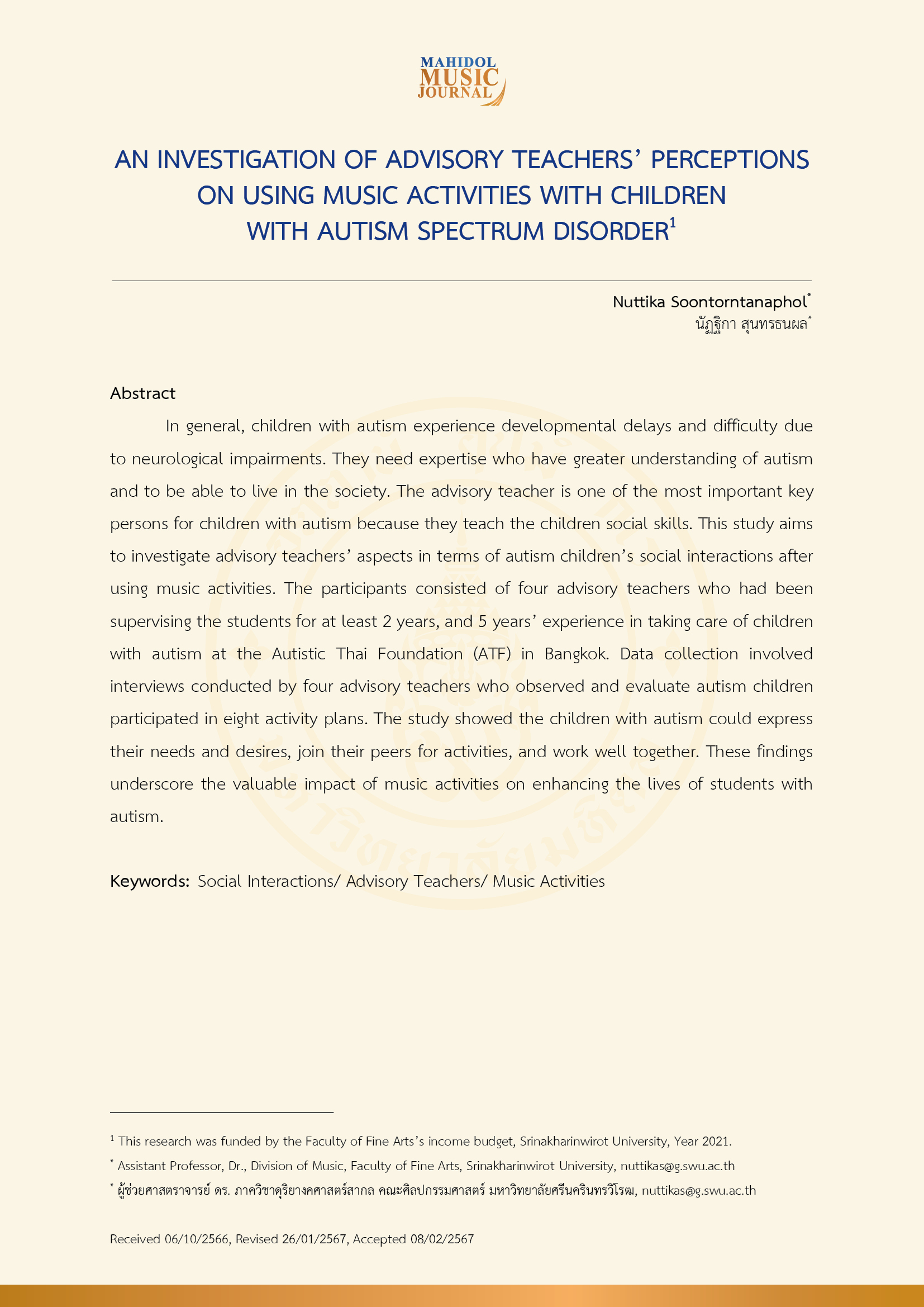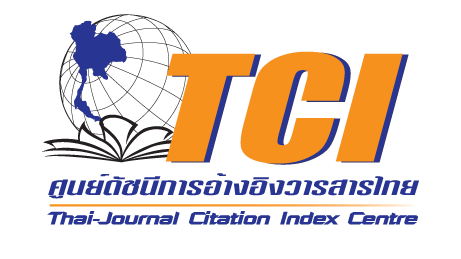AN INVESTIGATION OF ADVISORY TEACHERS' PERCEPTIONS ON USING MUSIC ACTIVITIES WITH CHILDREN WITH AUTISM SPECTRUM DISORDER
Keywords:
Social Interactions, Advisory Teachers, Music ActivitiesAbstract
In general, children with autism experience developmental delays and difficulty due to neurological impairments. They need expertise who have greater understanding of autism and to be able to live in the society. The advisory teacher is one of the most important key persons for children with autism because they teach the children social skills. This study aims to investigate advisory teachers' aspects in terms of autism children's social interactions after using music activities. The participants consisted of four advisory teachers who had been supervising the students for at least 2 years, and 5 years' experience in taking care of children with autism at the Autistic Thai Foundation (ATF) in Bangkok. Data collection involved interviews conducted by four advisory teachers who observed and evaluate autism children participated in eight activity plans. The study showed the children with autism could express their needs and desires, join their peers for activities, and work well together. These findings underscore the valuable impact of music activities on enhancing the lives of students with autism.
References
Archontopoulou, Anna, and Potheini Vaiouli. “Music and Social Skills for Young Children with Autism: A Survey of Early Childhood Educators.” International Journal of Educational Research Review 5, no. 3 (2020): 190-207.
Chinnapong, Pang. “Potential Impact of Music on a Child with Autism.” Accessed August 1, 2020. https://mgronline.com/qol/detail/9570000067415. (in Thai)
Grealish, Laurie. “The Skills of Coach are an Essential Element in Clinical Learning.” Journal of Nursing Education 39, no. 5 (May 2000): 231-233.
Jiemsak, Ruamsak. “The Guideline on Music Therapy Activities for Children with Special Needs through Learning Management Activities of Music Education for Children.” Journal of Humanities and Social Sciences, Phranakhon Si Ayutthaya Rajabhat University 8, no. 1 (January-June 2020): 85-112. (in Thai)
Jinokan, Pensuda. “The Study Social Behavior of Children with Autism from Use of Music Therapy.” Journal of Research and Development in Special Education 7, no. 1 (January-June 2018): 22-41. (in Thai)
Kosuwan, Kullaya, and Yuwadee Wiriyangkul. It’s Not Difficult to Teach Autistic Children If You Understand Them. Bangkok: Nation Books, 2019. (in Thai)
LaGasse, A. Blythe. “Effects of a Music Therapy Group Intervention on Enhancing Social Skills in Children with Autism.” Journal of Music Therapy 51, no. 3 (Fall 2014): 250-275.
Luiselli, James K., Dennis C. Russo, Walter P. Christian, and Susan M. Wilczynski, eds. Effective Practices for Children with Autism: Educational and Behavior Support Interventions that Work. New York: Oxford University Press, 2008.
McGrath, Helen, and Shona Francey. Friendly Kids, Friendly Classrooms: Teaching Social Skills and Confidence in the Classroom. South Melbourne: Longman Cheshire, 1991.
Phichityotsawat, Waranit. “The Effects of Music Therapy Activities on the Development of Communication and Social Interactions in Children with Autism.” Master’s thesis, University of the Thai Chamber of Commerce, 2012. (in Thai)
Phuttita. A Guide to Moving with a Child with Autism. Bangkok: Happy Family, 2007. (in Thai)
Ratanapairoj, Phanida, and Siripran Sanlung. Effects of Creativity Play towards Social Interaction of Early Childhood Autism, Rajanukul Institute. Bangkok: Rajanukul Institute, Department of Mental Health, Ministry of Public Health, 2011. (in Thai)
Riall, Debbie. The Autism Resource Manual: Practical Strategies for Teachers and other Education Professionals. Oxon: Routledge, 2022.
Soontorntanaphol, Nuttika. “The Development of Music Activities for Improving Social Skills in Children with Autism.” Journal of Fine and Applied Arts, Chulalongkorn University 9, no. 2 (July-December 2022): 40-58. (in Thai)
Trangkasombat, Umaporn. The Guideline on Parenting a Child with Autism. Bangkok: Family Research and Development Center, 2022. (in Thai)

Downloads
Published
How to Cite
Issue
Section
License
Copyright (c) 2024 College of Music

This work is licensed under a Creative Commons Attribution-NonCommercial-NoDerivatives 4.0 International License.
The copyright of the article belongs to the author. Published articles represent the views of the authors. The editorial team neither necessarily agree with nor take any responsibility for the article.





